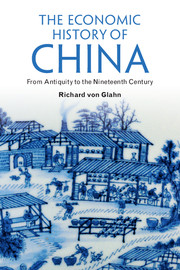Book contents
- Frontmatter
- Dedication
- Contents
- List of figures
- List of maps
- List of tables
- Acknowledgments
- Introduction
- 1 The Bronze Age economy (1045 to 707 BCE)
- 2 From city-state to autocratic monarchy (707 to 250 BCE)
- 3 Economic foundations of the universal empire (250 to 81 BCE)
- 4 Magnate society and the estate economy (81 BCE to 485 CE)
- 5 The Chinese-nomad synthesis and the reunification of the empire (485 to 755)
- 6 Economic transformation in the Tang-Song transition (755 to 1127)
- 7 The heyday of the Jiangnan economy (1127 to 1550)
- 8 The maturation of the market economy (1550 to 1800)
- 9 Domestic crises and global challenges: restructuring the imperial economy (1800 to 1900)
- Bibliography
- Index
Introduction
Published online by Cambridge University Press: 05 March 2016
- Frontmatter
- Dedication
- Contents
- List of figures
- List of maps
- List of tables
- Acknowledgments
- Introduction
- 1 The Bronze Age economy (1045 to 707 BCE)
- 2 From city-state to autocratic monarchy (707 to 250 BCE)
- 3 Economic foundations of the universal empire (250 to 81 BCE)
- 4 Magnate society and the estate economy (81 BCE to 485 CE)
- 5 The Chinese-nomad synthesis and the reunification of the empire (485 to 755)
- 6 Economic transformation in the Tang-Song transition (755 to 1127)
- 7 The heyday of the Jiangnan economy (1127 to 1550)
- 8 The maturation of the market economy (1550 to 1800)
- 9 Domestic crises and global challenges: restructuring the imperial economy (1800 to 1900)
- Bibliography
- Index
Summary
Until the 1960s, historians viewed China's history – and especially its economic history – through the lens of Western teleologies of historical change predicated on the progress of “freedom,” leading either to capitalist democracy or socialist utopia. As I have written elsewhere, whether construed in Weberian terms as a peculiar type of “bureaucratic feudalism” or in Marxist categories as a species of the “Asiatic mode of production” genus, both Western and Asian scholarship portrayed imperial China as a static society whose periodic changes in regime barely caused a ripple on the stagnant pond of despotism. The immobility of imperial Chinese society and economy typically was attributed to the parasitic nature of the imperial state and its dominant social class, the “gentry.” Although the Chinese empire was believed to share the basic features of “oriental despotisms” in general, its unique longevity could be explained by the remarkable durability of the gentry's dominance over government office, landowning, intellectual life, and culture. In contrast, for example, to the dispersion of social power among monarchs, warriors, clerics, seigneurs, and urban corporations in medieval Europe, the gentry monopolized political, economic, and cultural authority and deflected challenges from any insurgent group, be they merchants, military officers, or disaffected intelligentsia. In the eyes of Marxist historians, the persistence of gentry rule perpetuated feudal property ownership and relations of production in which the rentier elite absorbed the surpluses generated by the peasant families under their dominion. American scholars balked at employing the category of “feudalism,” given its Marxist associations, but their paradigm of “traditional” Chinese society essentially conformed to this depiction of economic inertia.
The most potent challenges to this image of an unchanging China were voiced by Japanese historians. Naitō Kōnan, writing in 1914, was the first to posit a fundamental transformation in Chinese government and society from the eighth to the twelfth centuries (what has become known as the “Tang-Song transition”) during which aristocratic domination dissolved and was superseded both by a more autocratic state and greater autonomy for village society. Naitō's disciple Miyazaki Ichisada, in his 1950 book East Asia's Modern Age, likened the Tang-Song transition to the European Renaissance, both of which exhibited the secularization of society and culture and the rebirth of rational philosophy on one hand, and the rise of cities, commerce, and the free disposition of property and labor on the other, that have become hallmarks of the modern world.
- Type
- Chapter
- Information
- The Economic History of ChinaFrom Antiquity to the Nineteenth Century, pp. 1 - 10Publisher: Cambridge University PressPrint publication year: 2016



